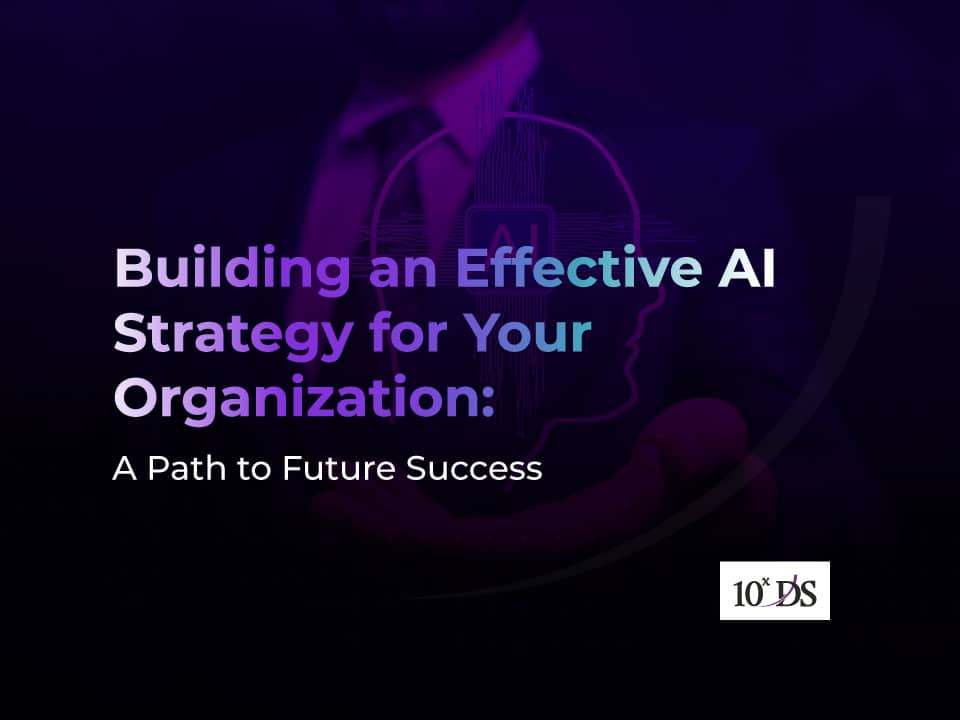
Building an Effective AI Strategy for Your Organization: A Path to Future Success
In today’s rapidly evolving technological landscape, the integration of Artificial Intelligence (AI) into business operations has become a crucial aspect of maintaining a competitive edge. Based on a survey result published by Accenture back in 2016, Artificial Intelligence is poised to double Annual Economic Growth Rate in 12 developed economies and boost labor productivity by up to 40 Percent by 2035. We see this as a reality now and organizations that harness the power of AI strategically can unlock new avenues for growth, enhance customer experiences, and drive operational efficiencies. As Paul Daugherty, chief technology and innovation officer, at Accenture, says, the playing field is poised to become a lot more competitive, and businesses that don’t deploy AI and data to help them innovate in everything they do will be at a disadvantage. In this blog, we will delve into the key steps to crafting an AI strategy, highlighting a real-life case study of companies at the forefront of this trend. We’ll also explore the essential components of an AI strategy and discuss how it can pave the way for your business to thrive in the future.
There are many companies that are using AI to improve their operations and provide better products and services to their customers. Alibaba is one of the examples of companies that have an AI strategy and are using it to innovate the way they work in real life. Alibaba is the world’s largest e-commerce platform that sells more than Amazon and eBay combined. AI is integral in Alibaba’s daily operations and is used to predict what customers might want to buy. This allows Alibaba to provide a more personalized shopping experience for its customers, which can increase customer satisfaction and loyalty. Another example is Bosch. Bosch is a multinational engineering and technology company that has established the Bosch Center for Artificial Intelligence in 2017 to facilitate the integration of cutting-edge artificial intelligence technology with Bosch products and services. This allows Bosch to develop innovative solutions that can have a real-world impact through advanced technologies.
Now that we all agree on how a well-designed AI strategy can help organizations to improve their efficiency, increase their competitiveness, and drive innovation, let us discuss on key considerations of building an AI Strategy and the components of it. An AI strategy is a comprehensive plan that outlines how a company or organization will leverage artificial intelligence (AI) to achieve its goals and objectives. Building an AI strategy involves identifying the key areas where AI can have the greatest impact, determining the resources and capabilities needed to implement AI solutions, and establishing a roadmap for integrating AI into the organization’s operations.
Alignment with Business Goals
Start by aligning your AI strategy with your organization’s overarching business goals. Understand how AI can address specific challenges, enhance processes, or create new revenue streams.
Data Readiness
AI thrives on data. Ensure your organization’s data is accurate, clean, and accessible. Data privacy and security must be maintained throughout the AI lifecycle.
Talent Acquisition and Development
Building an AI-focused team is crucial. Hire skilled professionals and provide training to upskill existing employees in AI-related domains.
Ethical and Regulatory Compliance
Incorporate ethical considerations and comply with relevant regulations. Transparency and accountability are vital when implementing AI solutions.
Iterative Approach
Implement AI initiatives incrementally, allowing for continuous learning and improvement. This minimizes risks and enhances adaptability.
Components of an AI Strategy
Discovery and Ideation
This phase involves identifying potential applications of AI within your organization. It’s about fostering creative thinking and brainstorming sessions to generate innovative ideas that leverage AI to address specific challenges or opportunities.
Feasibility Analysis
Before committing resources, assess the practicality and viability of AI initiatives. Evaluate factors like technical complexity, financial investment, resource availability, and potential return on investment (ROI) to determine which AI projects align with your business goals.
Technology Selection
Choose the appropriate AI technologies, tools, and frameworks based on the identified use cases. This step entails deciding whether machine learning, natural language processing, computer vision, or other AI disciplines best suit your organization’s needs.
Data Strategy
A robust data strategy involves determining how data will be collected, stored, cleaned, and integrated to support AI initiatives. High-quality data is the foundation of successful AI implementations, enabling accurate and meaningful insights.
Model Development and Training
Develop AI models by creating algorithms that learn from your data. Training involves feeding the model with relevant information to improve its accuracy and performance over time.
Implementation and Integration
This phase focuses on integrating AI solutions into your existing business processes and systems. Collaboration between different departments may be necessary to ensure seamless integration and minimal disruption.
Testing and Validation
Rigorous testing is crucial to ensure that AI models function as intended. Validate their performance against benchmarks and real-world scenarios to guarantee accuracy, reliability, and scalability.
Monitoring and Maintenance
Once deployed, AI solutions require continuous monitoring to detect anomalies, track performance, and make necessary adjustments. Regular maintenance ensures that AI systems remain effective and up-to-date.
AI’s Role in Future Business Success
As AI continues to shape the business landscape, companies that embrace AI strategically will thrive in various ways:
- Enhanced Decision-Making: AI-driven insights empower leaders to make informed, data-driven decisions quickly, leading to better business outcomes.
- Personalized Customer Experiences: AI enables personalized recommendations and interactions, fostering stronger customer relationships and loyalty.
- Operational Efficiency: Automation of routine tasks and processes increases efficiency, allowing employees to focus on high-value activities.
- Innovation and Productivity: AI-driven innovation leads to the creation of new products, services, and revenue streams, driving overall productivity.
- Competitive Advantage: Early AI adoption can establish a competitive advantage, positioning your organization as an industry leader.
In conclusion, crafting a robust AI strategy is paramount for organizations seeking to thrive in the dynamic business landscape of the future. Leveraging real-life case studies, considering key factors, and developing a comprehensive AI strategy will position your organization for success. As AI continues to evolve, its integration into business operations will be a driving force behind innovation, efficiency, and sustained growth. Embrace the power of AI today to shape a brighter future for your organization.
Talk to our experts to know more.


